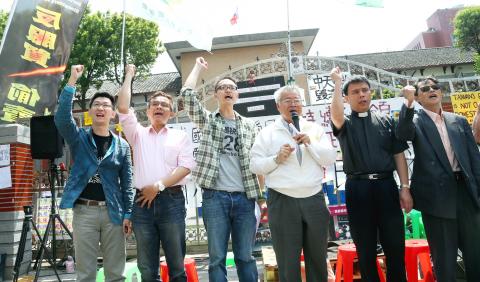National Taiwan University student Hung Chung-yen (洪崇晏) yesterday denied being the “mastermind” behind the demonstration outside the Zhongzheng First Police Precinct station on Friday, but showed his support for the cause by attending an event yesterday outside the Legislative Yuan in Taipei organized by groups seconding the Alliance of Referendum for Taiwan’s petition to make the plaza in front of the legislature a place where people can congregate.
The demonstration outside Taipei’s Zhongzheng First Police Precinct office was triggered by police’s forced eviction of protesters from the plaza — which the alliance had occupied since day one of the students’ seizure of the Legislative Yuan’s chamber — and its subsequent announcement that it had permanently revoked all assembly and parade permits for the group.
Hung yesterday said that he — like the other protesters — went to Friday’s event in response to a call circulating on the Internet earlier that day urging the public to “pass by” the police station.

Photo: Liu Hsin-de, Taipei Times
“If there was a mastermind of the protest, it would be President Ma [Ying-jeou’s, 馬英九] administration and those executive agencies who turned a blind eye to the public’s calls and expressions of dissent,” he said.
“I will not try to avoid any criminal charges I might be accused of for ‘violating’ the unconstitutional Assembly and Parade Act (集會遊行法). I want to show the ridiculousness of this ‘bad law,’” Hung added.
The clause of the act regarding the need to obtain authorities’ approval before staging a protest was ruled unconstitutional by the Council of Grand Justices earlier this year.
At yesterday’s rally, Anti-Nuclear Action Alliance convener Kao Cheng-yan (高成炎) criticized the legislature for failing to hold a scheduled floor meeting yesterday, making it impossible for it to receive the plaza petition.
“What was the point of chasing the students away from the occupied chamber so desperately then?” he asked.
Calling on the legislature to return the plaza to the people, he said that the Legislative Yuan’s front gate did not exist when the 520 Peasant movement broke out in 1988.
“In addition, I petitioned several times for the anti-nuclear cause in the 1990s on the front plaza without applying for a permit,” Kao said, adding that in 1999, the space was also used by hunger-strikers demanding the passage of a referendum act.
Taiwan Environmental Protection Union secretary-general Andy Tung (董建宏) said the space in front of the legislature’s building should be used to enable public participation, instead of muting people’s voices.
Hung also underlined the need for the public to keep demanding that the government probe the forced dispersion of alliance protesters.
“This case should not simply end with the police reinstating the alliance’s right to assembly,” he said, adding that someone has to be held accountable for the erroneous decision.
Rebuffing accusations that he harbors a grudge against the police, Hung said that he has supported the establishment of a police labor union since last year, when he took to the streets with officers’ families to call for better treatment of law enforcement personnel.

Taipei has once again made it to the top 100 in Oxford Economics’ Global Cities Index 2025 report, moving up five places from last year to 60. The annual index, which was published last month, evaluated 1,000 of the most populated metropolises based on five indices — economics, human capital, quality of life, environment and governance. New York maintained its top spot this year, placing first in the economics index thanks to the strength of its vibrant financial industry and economic stability. Taipei ranked 263rd in economics, 44th in human capital, 15th in quality of life, 284th for environment and 75th in governance,

Greenpeace yesterday said that it is to appeal a decision last month by the Taipei High Administrative Court to dismiss its 2021 lawsuit against the Ministry of Economic Affairs over “loose” regulations governing major corporate electricity consumers. The climate-related lawsuit — the first of its kind in Taiwan — sought to require the government to enforce higher green energy thresholds on major corporations to reduce emissions in light of climate change and an uptick in extreme weather. The suit, filed by Greenpeace East Asia, the Environmental Jurists Association and four individual plaintiffs, was dismissed on May 8 following four years of litigation. The

A former officer in China’s People’s Liberation Army (PLA) who witnessed the aftermath of the 1989 Tiananmen Square massacre has warned that Taiwan could face a similar fate if China attempts to unify the country by force. Li Xiaoming (李曉明), who was deployed to Beijing as a junior officer during the crackdown, said Taiwanese people should study the massacre carefully, because it offers a glimpse of what Beijing is willing to do to suppress dissent. “What happened in Tiananmen Square could happen in Taiwan too,” Li told CNA in a May 22 interview, ahead of the massacre’s 36th anniversary. “If Taiwanese students or

The New Taipei City Government would assist relatives of those killed or injured in last month’s car-ramming incident in Sansia District (三峽) to secure compensation, Mayor Hou You-yi (侯友宜) said yesterday, two days after the driver died in a hospital. “The city government will do its best to help the relatives of the car crash incident seek compensation,” Hou said. The mayor also said that the city’s Legal Affairs, Education and Social Welfare departments have established a joint mechanism to “provide coordinated assistance” to victims and their families. Three people were killed and 12 injured when a car plowed into schoolchildren and their